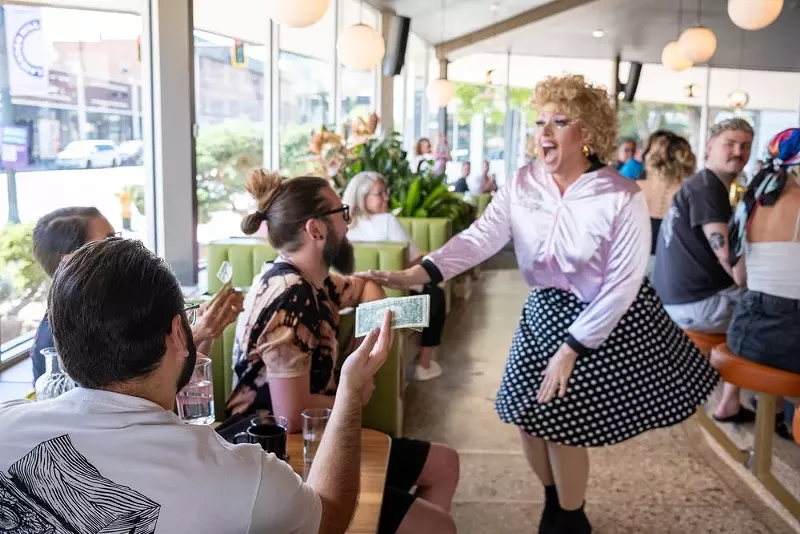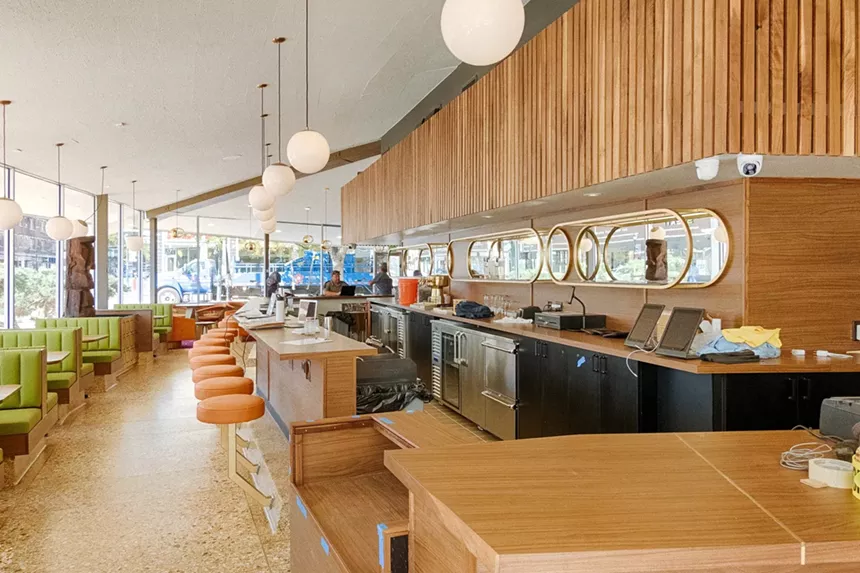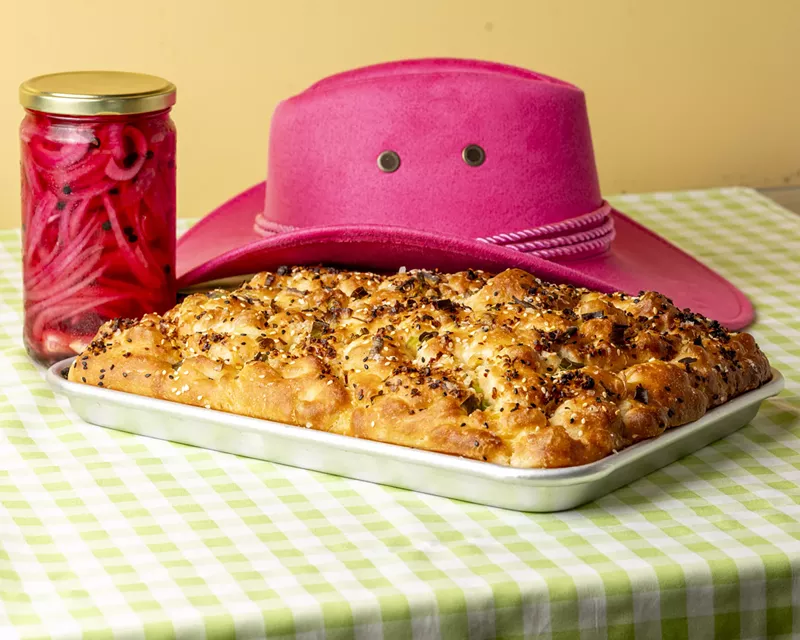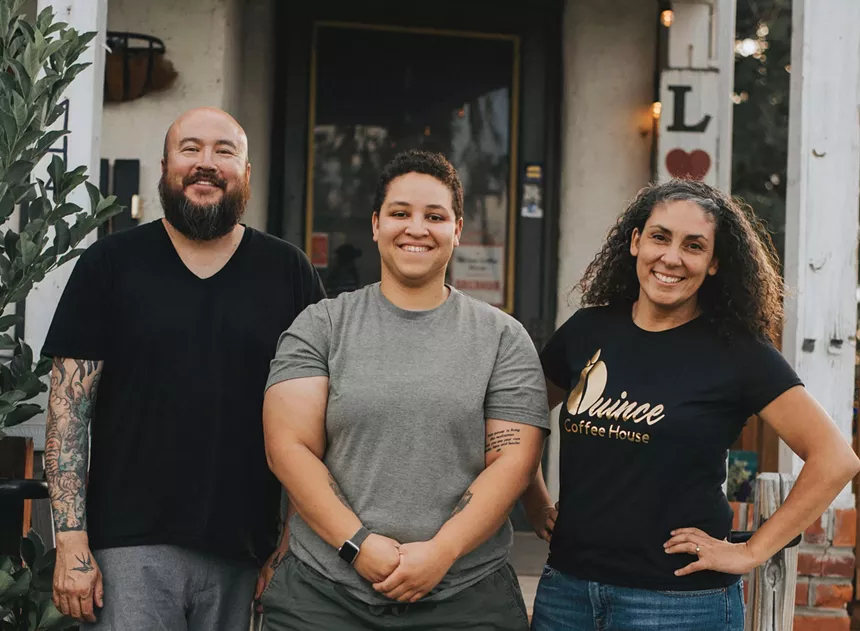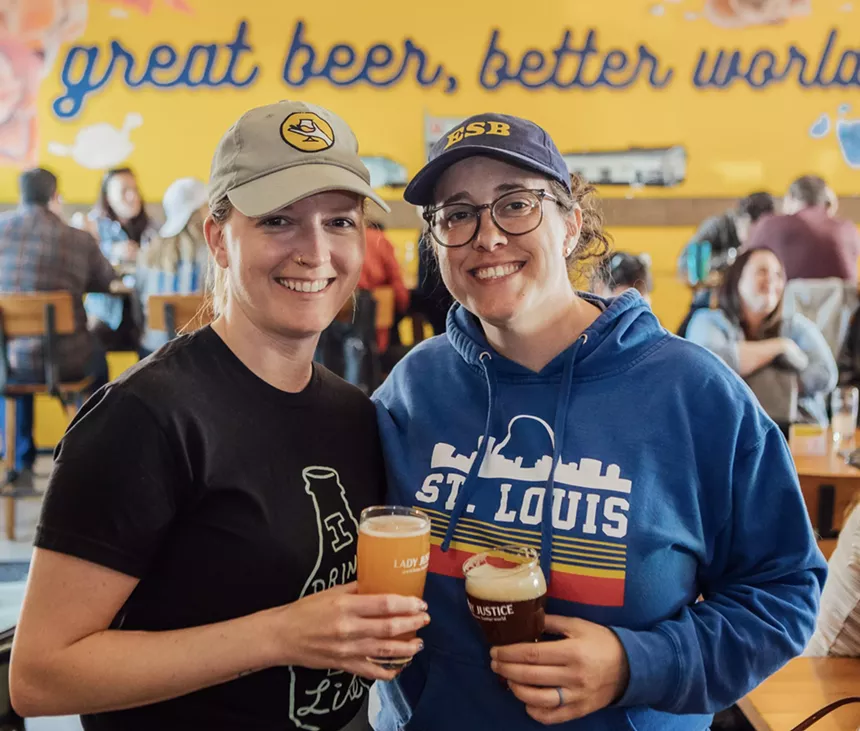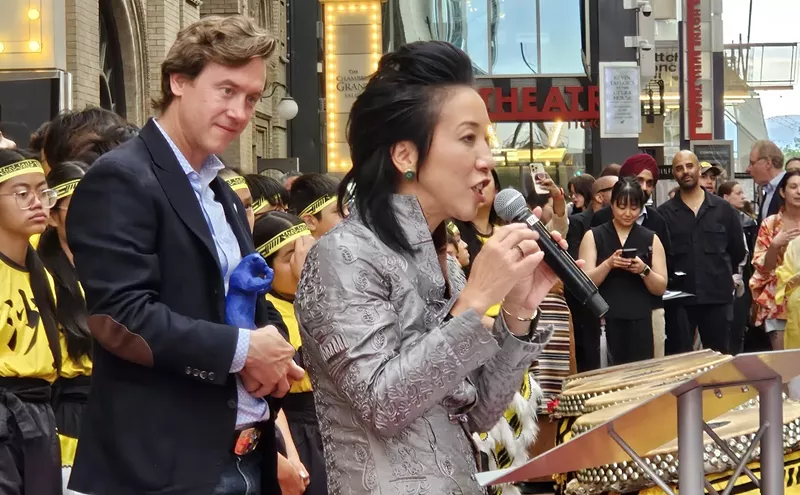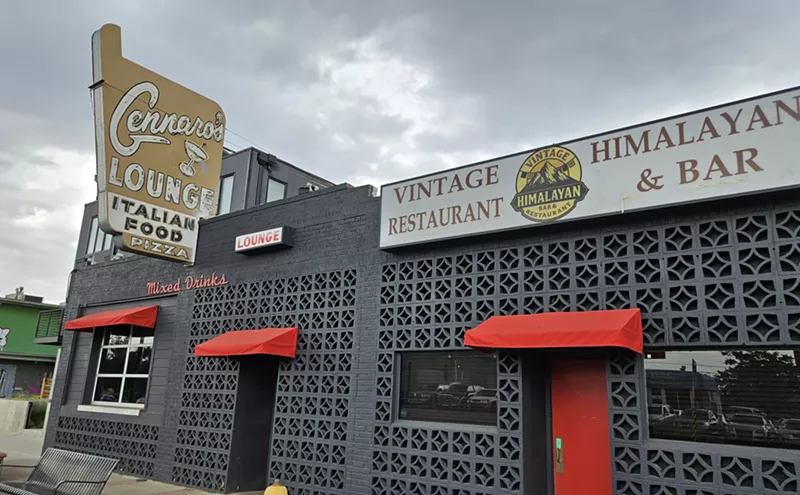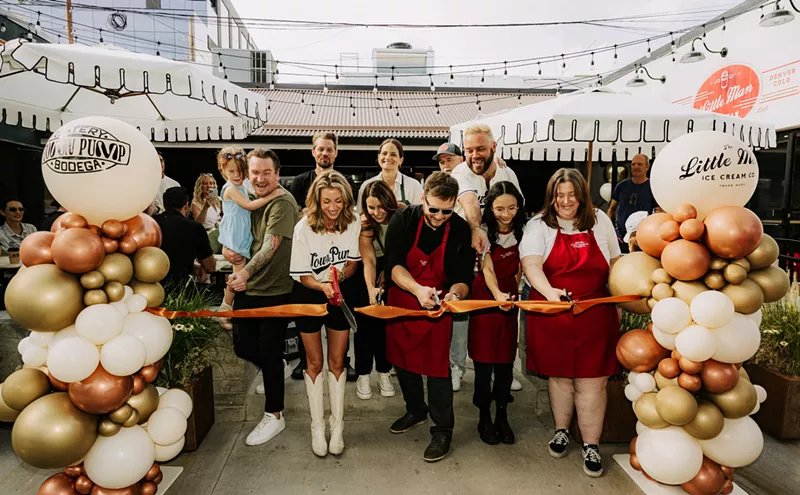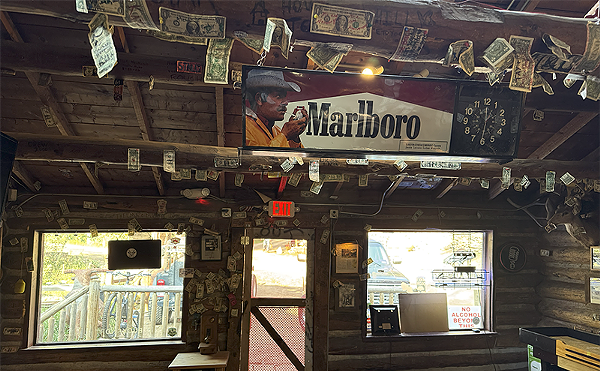To be queer in America has never been simple, and that's especially true right now. In a year marked by escalating political (and physical) attacks on the LGBTQ+ community — from book bans and drag restrictions to threats against trans health care — the hits keep coming: against queer bodies, against queer stories, against queer joy.
“As recent as the raid on the gay bar in Pittsburgh and around the country they’re talking about putting it to vote to take away the right to marry and then also strip the legal rights to not be discriminated against,” says chef Elise Wiggins, who grew up in Louisiana and came out in college. “Even in this blue state of ours, there’s just a palpable amount of hate that’s out there…it’s just, it’s terrifying, you know?”
As the national rhetoric becomes more hostile, queer business owners have to contend with far more than supply-chain issues, rising minimum wages and a softening economy. They have to run businesses at a time when their identities are being debated on the national stage. What is their responsibility to themselves, their employees, their customers and their community? How do they navigate defending their right to exist and how it intersects with how they make a living?
These are especially challenging questions in the hospitality industry. Unlike industries that are more transactional, hospitality is inherently relational, where each business is a blend of personal vision and public service. Their businesses create and maintain space (literal and figurative) for the personal, the social and the community. And these are particularly important questions to ask during Pride Month.
Talking to queer business owners in Denver, a consistent theme that emerges is the importance of gathering spaces. For any marginalized community, public spaces often come with scrutiny or risk. Dedicated safe spaces offer a rare environment where they can exist without being watched, questioned or targeted. These places allow them to express themselves on their own terms through food, language, music, ritual and aesthetics. Often, their spaces build informal support networks where people exchange information, organize politically, and find jobs, housing or just emotional support.
Many were devastated as they saw their favorite gay club or lesbian bar close down during COVID. “I was reading the stories of all these important bars throughout history that were closing and thinking, ‘I don’t want that to be the case,’” explains Brandon Bishop, who started plant-based food retailer SRYBB along with co-founder Spencer Young. “We need those spaces. Those spaces have a purpose and, yeah, sometimes that purpose is like we just wanna party and enjoy ourselves in a place where people can experiment with their identity and pursue their identity and live in their truth.”
We caught up with five queer-owned businesses to discuss how they're creating space for themselves, their community and their customers:
Champagne Tiger: Keeping the Party Going
“Queer celebration and joy has its own energy and I find it life-giving and affirming and just fun,” says Chris Donato. “In Denver there’s so many great queer spaces, whether it be clubs and bars, but I didn’t see a queer restaurant per se [where there are] drag shows and cabaret performances and excellent food, just a place to showcase queer joy while enjoying the finer things.” So in late 2020, Donato, who spent thirteen years at Frasca Hospitality, and his husband started Champagne Tiger as a pop-up before eventually settling into its current-day brick-and-mortar in the former home of Tom's Diner at 601 East Colfax Avenue in September 2024. It’s always a party at the boozy, glam restaurant located in Lavender Hill, Denver’s first designated Queer Cultural District. The music’s loud and fun, there are drag performances almost every week, and the food is low-high indulgences like a luscious custardy quiche, mustard roasted chicken that takes 45 minutes to cook, caviar service on an ashtray, and tater tot waffles loaded with caviar, crème fraiche and chive.
Champagne Tiger is well-known in the queer community for its brunch and drag shows; its owners, customers and vibe are unapologetically gay. There’s a fabric portrait of Siegfried and Roy, “the most famous roommates of all time,” jokes Donato, that he placed right at the front as tribute.
Recently, that unapologetic gayness has become a source of comfort for many. “I’ve never worked at a restaurant where so many people come cry,” Donato says. “It’s tears of release, tears of happiness, tears of joy. At least three or four times a week. They come in and they feel at ease and they feel taken care of, they feel seen for who they are…they kind of get overwhelmed with joy and comfort and feeling included.”
Cattivella: Leading with Hospitality
Unlike Champagne Tiger, Cativella’s interior has few indications of the queer identity of its owner, Wiggins. There’s a small Pride sticker in the front window along with a few displayed awards; since the election, Wiggins has thought about removing even those signals.When Cattivella opened in 2017 at 10195 East 29th Drive in the Eastbridge Town Center, "there weren't really hate issues. So you didn’t have to say, ‘I’ve gotta create space for people that are gay or trans.’ We didn’t have to do that,” says Wiggins, who wanted customers to know the restaurant for its wood-fired pizzas and handmade pasta dishes like the rabbit gnocchi with tarragon, mushroom, leek, shallot, preserved tomato and gorgonzola cream, or the Pasticcio — a rich casserole combining tortellini, meatballs, bolognese, herby pomodoro and béchamel.
Wiggins is a fan of passive persuasion, letting people get to know her before they find out she’s queer. It’s the same approach she’s taking with her restaurant and customers. “I feel like if you run your banner up too high, people who don’t believe and don’t support will not come in. Whereas if they come in and they’re like, ‘This is just a regular restaurant that we’ve heard great things about with great food and great service,' then lo and behold they have a gay server and they get amazing service,” Wiggins says. “That subtlety of having just great service and perhaps they glance up and they see different walks of life that are here.”
SRYBB: A Strategic Retreat
Bishop and Young had always envisioned growing SRYBB: opening a full-scale restaurant, expanding into wholesale, even mass-producing their vegan chorizo. But then Trump was elected.
“Spencer and I talked about it, and we were really preparing for an extremely hostile environment and I do think it’s only going to get worse,” explains Bishop. “So a question we asked was, ‘How do we insulate ourselves?’”
On March 1, SRYBB moved into X Bar, the LGBTQ+ bar right off East Colfax Avenue at 629 East Colfax, where they now run the kitchen six days a week, turning out plant-based, Mexican-inspired comfort foods like jackfruit quesabirria, vegan chorizo tacos and chile oil focaccia breadsticks.
The move was both strategic and protective. It gave the partners a secure, welcoming space to operate from, while also putting them directly in front of the community that's been their biggest supporter. “It was a little bit of a protection mechanism to go in a space that we know we’ll be welcomed in,” Bishop says. “And each day that goes by, I just think, ‘Wow, I made the right decision.”
Quince Coffee House: Call to Action
Both Jenna Greenwood and Katharine Hiltbrand come from educator backgrounds, having met while working in the University of Colorado Boulder’s diversity programs. When they took over Quince Coffee House at 1447 Quince Street four years ago — along with Katharine’s husband, John Hiltbrand — they brought that same ethos to their business. They “run the business with a similar orientation to an education space or a diversity center,” describes Greenwood. Quince operates as a social enterprise, offering sliding-scale room reservations, commission-free art by BIPOC and marginalized artists, and hosting events ranging from children’s social justice reading groups to queer grief circles and trans biker gang breakfasts.
Over the past few months, Greenwood says, Quince has naturally evolved into more of a community hub. “After the election, it feels that it’s been more of a needing,” describes Greenwood. “There’s a large influx of social movements, groups meeting at the shop, and a huge influx of people wanting to just be in the space, engage the community, to just be held by the space and just to feel able to settle.”
In response, the team has streamlined its process to better manage growing demand and focus on events that most directly serve their community. “People are asking for help a lot more, it just feels like the space is a lot more needed, the soul level need for organizing together and coming together in the space to support and hear each other,” describes Greenwood.
Lady Justice Brewing: Mission as Usual
The idea from Lady Justice Brewing started when its three founders — Betsy Lay, Kate Power and Jen Cuesta — were chatting over a beer. All three were working for AmeriCorps, earning $10,000 a year and dependent on the SNAP program to buy groceries, “and throughout all of that, we were still saving enough money to be able to go grab a beer with each other after work,” describes Lay. “ That conversation turned into like, how do we get people to take their beer money that they've set aside and put that back into the community to do good work?” They started Lady Justice Brewing in 2016 as a beer membership: 100 percent of the profits go back to Colorado nonprofits that support women, girls and non-binary people. Eventually, they grew the business into a brick-and-mortar tap room and patio at 3242 South Acoma Street, Englewood. The business donates an average of $10,000 a year to organizations such as Ralston House, New Era, Girls Rock and the Gathering Place, one of the few drop-in centers that accept trans people.
They’ve been in business for three national elections and found that “the day after a national election and June 1 [first day of Pride Month] is when we get the most anti-queer comments on social media,” Lay says. “They’re not doing it because they came in and had a bad experience…they think they get to have an opinion about who we are just as women and queer folks in the world. I don’t know if it’s because they think their side ‘won’ and now they get to treat us poorly.”
In response, Lady Justice is committed to being such a safe space for queer folks. There’s pride and trans flags in the window, 60 percent of the staff members are queer, and there’s a giant poster of the house rule: “Homophobia, transphobia, misogyny, racism, ableism, and other hateful or hurtful intolerance will not be tolerated” and “We support love, self-love, and absolute joy.”
The owners have no plans to change that. “Our key has been consistency and just being who we are along the way and not shying away from that. Not pretending to be more than we are and not trying to do less than we’ve ever done,” Lay says. “Lady Justice has existed pretty much since this new era of politics that we’re in right now. And we’ve never changed. We’ve stayed consistent.”
What Can You Do?
Donald Trump isn’t the first president to weaponize hate against the queer community — and he won’t be the last. History is filled with efforts to erase queer lives, culture and spaces. But these spaces don’t just appear: They’re built, sustained and protected by the people who show up for them. “If you don’t like how this country is bashing queer and trans people, then go and support their businesses — because that’s our livelihood,” pleads Bishop. “If we’re not supported, that’s another queer business that’s out. That’s a future queer-owned space that’s not going to exist in a few years. And if you want those spaces and you want those communities to thrive, they have to be financially supported. Times are tough economically, but we have to find a way forward together.”

